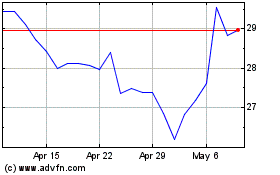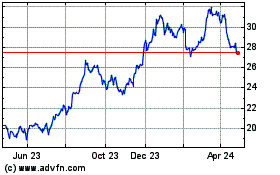Most hedge-fund casualties of the financial crisis liquidated
years ago. But investors in two funds that Dallas-based Highland
Capital Management closed in October 2008 are still owed hundreds
of millions of dollars as the fund liquidations stretch into their
ninth year.
Now investors, including a classical-music charity in Los
Angeles and a Christian university in Texas, are suing Highland to
recover money they allege it cheated them out of, in a pair of
pending cases.
Highland's founders James Dondero and Mark Okada have fought an
unusual number of legal battles since the crisis. But the two new
lawsuits mark the first time organized committees representing all
investors in the liquidating hedge funds have sued the firm; one of
the committees recently scored a victory in its case.
The lawsuits claim Highland, which manages about $17 billion,
enriched itself by secretly taking a roughly $30 million fee out of
one fund, called Crusader, and inappropriately selling assets from
a second, called Credit Strategies.
"Just when you think you've seen it all, Jim Dondero comes up
with a new twist," says Geoffrey Stern, president of Muirfield
Capital Management, which invested in Crusader. "They just took our
money."
The money Highland withdrew from a reserve account in the
Crusader fund was part of a deferred fee that belonged to the firm,
not to fund investors, a company spokeswoman said via email. The
contested asset sale, from a fund called Credit Strategies, was in
the best interest of investors, she said.
Many hedge-fund managers closed during the financial crisis over
disputes with investors and the Wall Street banks with which they
traded. Highland decided to close the hedge funds but waited to
liquidate investments, later fighting in court against banks and
investors who demanded immediate repayment.
Highland recovered more for investors—$1.55 billion so far for
Crusader—because it waited to sell assets, fetching higher prices,
and because it litigated to defend investor interests, said the
firm's General Counsel Scott Ellington.
The legal wrangling with banks and investors ended in a mix of
wins, losses and settlements for Highland. The firm also settled
with the U.S. Securities and Exchange Commission over alleged
improper trades of client assets; Highland neither admitted nor
denied wrongdoing.
At its peak in 2007, Highland managed about $39 billion, much of
it in loan funds called collateralized loan obligations, but also
in hedge funds that bought corporate debt, private equity,
mortgage-backed bonds, bundles of life-insurance policies and
timberlands.
When prices of many such complex instruments plummeted in 2008,
Highland's flagship Crusader fund lost about $1.5 billion, or 50%,
according to documents reviewed by The Wall Street Journal.
Investors in Credit Strategies suffered heavier losses as banks
repossessed about 80% of its assets, which Highland had pledged as
collateral for loans, people familiar with the matter said.
Highland spent two years negotiating with investors in these
"zombie" hedge funds over how best to split up liquidation
proceeds. In 2011, Crusader investors agreed to a schedule of
liquidation and to a $47.5 million deferred fee payable to Highland
for its precrisis performance, but only after "complete liquidation
of the Crusader Funds' assets," according to a copy of the
liquidation plan reviewed by The Wall Street Journal. Credit
Strategies investors agreed to a liquidation plan but with no fees
for Highland.
The Crusader fund's liquidation was contentious from the start.
By the spring of 2012, investors including Baylor University and
Grosvenor Capital Management had received about $500 million and
they urged Highland to sell more assets and speed up
repayments.
Highland responded by offering to buy investors out immediately
at 75% of fair value, according to documents reviewed by The Wall
Street Journal. Several large investors rejected the deal because
they considered the buyout price too low, people involved in the
process said. Highland responded by telling investors it planned to
cut the price to 50% of fair value, then decided to abandon the
buyback, according to the documents.
The firm was "in good faith attempting to devise a creative,
viable, solution," a Highland spokeswoman said.
The liquidation continued slowly, frustrating investors. They
decided in April to sue Highland, when the firm disclosed in a
financial report that months earlier it had paid itself part of the
deferred fee, which investors say breached their agreement to wait
for full liquidation before withdrawing the roughly $30
million.
Crusader still held $270 million of assets in July, according to
a letter Highland sent to the committee in August. The committee of
fund investors sued Highland in Delaware Chancery Court to fire the
firm as Crusader's manager and recover the fee it allegedly
took.
Highland said it was entitled to the fee because Crusader's
assets were frozen by a temporary restraining order from a lawsuit
UBS Group AG filed against the firm for failing to pay $745 million
it allegedly owed the bank, making it impossible to liquidate on
schedule. Highland had been aware of the UBS lawsuit, filed in
February 2009, for two years when it agreed to the Crusader
liquidation plan in May 2011, and the restraining order was in
place from August to November 2013 and from January 2014 to January
2016.
Highland agreed in August to be replaced by restructuring
specialist Alvarez & Marsal as Crusader's manager after the
committee filed its lawsuit.
Selling off assets in the second fund, Credit Strategies, also
has been fraught. One of the largest investments left in the fund
in 2011 was a 19% private-equity stake in Cornerstone Healthcare
Group, an acute-health-care company majority owned by Highland and
its other hedge funds.
The shares became a flashpoint in 2012 after Highland proposed
selling the stake to Cornerstone for less than what investors
considered fair value. Investors led by the Colburn Foundation, a
Los Angeles-based classical-music charity, and investment adviser
Concord Management refused and tempers flared.
Mr. Dondero called the investors "idiots," and "disrespectful,"
for questioning the proposed share sale, according to emails
disclosed in court documents. He also pushed the investors to start
paying Highland a $250,000 monthly management fee for liquidating
the defunct fund because of the "significant monthly legal
expenses" involved, according to the emails.
The investors refused and Brant Behr, a director at Concord,
sent Mr. Dondero an email telling him, "I had also thought you
agreed to unwind this portfolio at no charge because of the notable
losses your fund incurred."
The hedge-fund investors misunderstood Highland's proposals,
"resulting in frustration on both sides," the company spokeswoman
said.
The conflict escalated in 2013 when investors learned Highland
had secretly sold the fund's stake to Cornerstone for $24 million,
13% less than Highland's own valuation of the shares, according to
an arbitration-panel finding.
"Highland hid from us that it was selling the position, and then
sold it for a below-market price, cheating the investors out of
their money," says Colburn's former executive director Ruth
Eliel.
The investors demanded arbitration, winning an award against
Highland in April for its "willful misconduct" in selling the stake
at a low price "to the benefit of Highland," according to the
award. A U.S. District Court of New York upheld the award and
ordered Highland to pay $11.4 million in damages and interest and
to disburse $35 million from the fund in August.
Mr. Ellington, Highland's general counsel, said that Highland
has appealed the ruling and that the sale price was favorable for
investors because Cornerstone's value fell in recent years.
"Every other fund manager I had did the right thing in the
crisis," said Eloise Yellen Clark, CEO of Los Angeles-based
financial adviser OmniQuest Capital LLC, whose firm has had
investments tied up for years in Crusader. "It is my opinion that
Highland did not."
(END) Dow Jones Newswires
October 24, 2016 16:45 ET (20:45 GMT)
Copyright (c) 2016 Dow Jones & Company, Inc.
UBS (NYSE:UBS)
Historical Stock Chart
From Mar 2024 to Apr 2024

UBS (NYSE:UBS)
Historical Stock Chart
From Apr 2023 to Apr 2024
